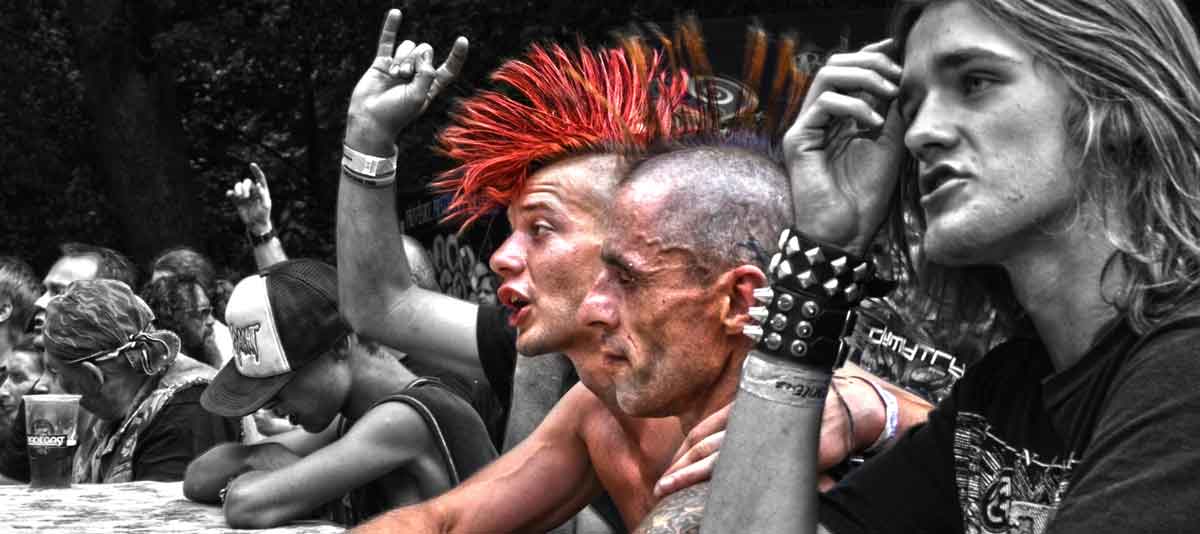Identity, Semiotics, & Haircuts Identity, Semiotics, & Haircuts

It’s uncool to publicly proclaim your affection of something that is critically popular, and I’m not really sure why that is. I’m sure if I Googled hard enough, I would find a scientific explanation that would render this article (and your reading effort) a waste of time. However, this is happening.
Identity.
I suspect that part of our disdain for those who announce their love for popular things is that at some point those things weren’t popular, and their exclusivity made up part of someone’s identity. I was cutting edge, I was an early adopter. I was brave, willing, fearless, unique. Myself. Finally, an object that tells the world what I’m like. But then everyone starts using it. Even though you were first, no one cares, because they love it too now. Now it’s their thing as well, and you are back in the pack. Samesies. Your uniqueness has now been overrun by your worst fear – conformity. The same principle applies with job hunting, dating, and generally being in society. Our things tell the others who we are.
I read an article recently that talked about how great it is to be yourself in job interviews and job roles even if you are a scruffy haired, unshaven, no-makeuppy type. The problem is that we have an expectation of what “suitable” or “professional” looks like, and it’s not jeans, scruffy hair or looking tired. These people are usually extraordinarily successful and influential, or, unemployed. If Richard Branson wasn’t Richard Branson, he’d probably struggle to get work – dyslexic, high school dropout, festival style dress sense. He’d have to pretend.
For some reason, what we look like correlates with how competent and valuable we can be. Despite our best efforts, our identity determines what others think of our capabilities, and identity is based on our things and our appearance. Ron Shelton made a movie out of the concept: A geeky white guy can’t b-ball. But it turns out he can. And he b-balls like a motherf*****. You’ve been served.
Cassandra is selling her home. Her agent arrives. Perhaps they arrive in an old Corolla. Cassandra’s first thought is, “This person can’t be very good at selling houses because if they were, they would have a nicer car.” Perhaps if Cassandra put this to the agent, and the agent was feeling safe, they’d tell Cassandra that they have found contentment and happiness in other areas of life beyond possessions, and they are actually loaded. Perhaps Cassandra would crap her pants and turf that agent because they’re a weirdo.
It’s not easy to have an identity without “things”. Sorry, that’s not right. It’s not easy to be comfortable with your identity, without “things”.
And semiotics.
If someone screws up their face and holds their nose, it probably means something stinks. They don’t need to verbalise it. Unfortunately our history has told us over and over again what success/capabilities/talent look like. Nice clothes, formal language, neat appearance, probably tattoo-less, and piercing-less. There is no way that a talented accountant could have an eyebrow ring. It even says so in Xero’s fine print.
I once heard a presenter at a seminar tell the men in the audience that if they were serious business men, they need to wear a nice watch and buy a nice pen to get deals done. He wasn’t taking the piss. This was based on a study.
Options
There are two, really. The first one is to understand what is expected and do your best to fit those expectations to attain what you want. This is feasible, possible, and can be lucrative. It’s tricky to fit in, but can be done and can bring with it some level of satisfaction. I don’t say this as some dismissive, patronising throw-away. It absolutely can be done, and has been done successfully forever.
Option two is to not do option one. Be whatever yourself is. This will absolutely mean handling a lot of rejections and refusals (like, probably more than a hundred), but the reward is that you can take comfort in knowing that when you receive an acceptance or opportunity (or find love), it will be because you have been chosen because of who you are rather than how you are perceived through how you present.
I suspect that those who resonate with option one haven’t read this far, which is probably for the best because option one sucks. If you want to spend five days a week being someone you are not, join the theatre group. Pretending will eventually ruin you. And theatre is kickass.
We’ll never get over “things” determining who we are in the eyes of others. Marketing and advertising is too good. Outstanding, really. There is no possible logical way in the world that Nike sneakers are the most ideal, suitable sneaker for athletes worldwide. But that doesn’t matter, because I’m not just an athlete, I’m a Nike Hypervenom athlete, a world-beating, ass-kicking, Christiano-Ronaldo Nike Hypervenom level athlete even though he now wears Mercurials but I can’t afford those ones.
And I think that’s why. I think that’s why liking “popular” can be upsetting for others. We are trained to prove our value and identity by collecting and displaying “things”, and when others who are not like us also claim those things for their identity, it upsets us. But it’s always going to be here and perhaps instead of us getting upset should someone try to “thing” shame us, we need to remind them how kickass they are regardless of if they were first or not.
Just for the record, I cut my own hair in the bathtub with a small mirror. I don’t say that as some kind of confession. It’s totally a brag. And it shits my wife to tears.









